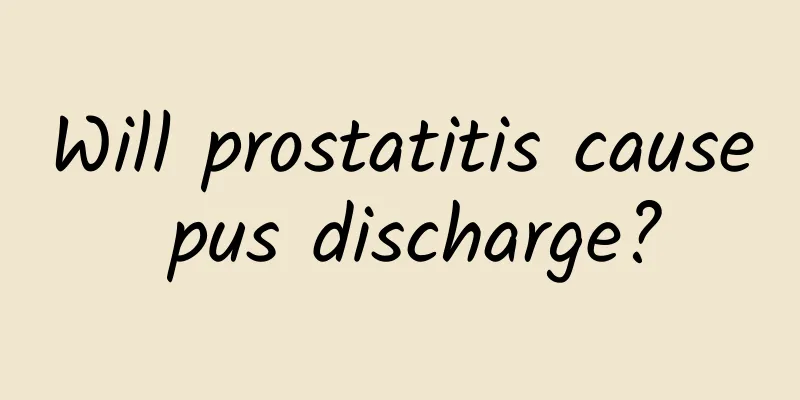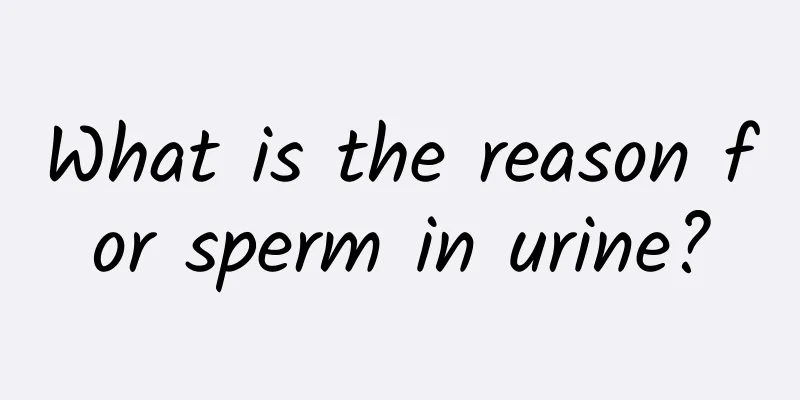Will prostatitis cause pus discharge?

|
For men, it seems that they don't need to pay special attention to their private parts like women do in life. After all, men's private parts are not easily invaded by bacteria and viruses. But for the organs contained in their reproductive systems, men and women are the same and need effective protection. Take the prostate of men for example, it is like the ovaries of women, both are very important. So, will prostatitis cause pus discharge? Prostatitis generally does not cause pus formation, unless it is a severe infection, then pus formation will occur. Chronic prostatitis refers to chronic inflammation of prostate tissue caused by various etiologies. It is the most common disease in urology. It includes chronic bacterial prostatitis and non-bacterial prostatitis. Among them, chronic bacterial prostatitis is mainly caused by pathogen infection, mainly retrograde infection. The pathogen is mainly Staphylococcus. There is often a history of repeated urinary tract infection or the presence of pathogenic bacteria in prostate massage fluid. Non-bacterial prostatitis is a complex pathological change caused by a variety of complex causes and inducements, involving inflammation, immunity, and neuroendocrine, resulting in urethral irritation symptoms and chronic pelvic pain as the main clinical manifestations, and it is often combined with mental and psychological symptoms. The clinical manifestations are diverse. The course of the disease is slow and prolonged. Causes 1. Chronic bacterial prostatitis The causative factor is also mainly pathogen infection, but the body's resistance is strong and/or the pathogen's virulence is weak, with retrograde infection being the main cause. The pathogens are mainly Staphylococcus, followed by Escherichia coli, Corynebacterium and Enterococcus, etc. Prostatic stones and urine reflux may be important reasons for the persistence of pathogens and recurrence of infection. 2. Chronic nonbacterial prostatitis The etiology is very complex, and its main cause may be the combined effect of pathogen infection, inflammation, abnormal pelvic floor neuromuscular activity, and immune abnormalities. (1) Pathogen infection Although routine bacterial examinations fail to isolate pathogens in patients with this type, they may still be related to certain special pathogens, such as anaerobic bacteria, L-type proteobacteria, nanobacteria, or infections with Chlamydia trachomatis and mycoplasma. Studies have shown that the detection rate of local prokaryotic DNA in patients with this type can be as high as 77%; some clinical "aseptic" prostatitis with chronic inflammation, recurrent attacks or aggravation may be related to these pathogens. Other pathogens such as parasites, fungi, viruses, trichomonas, and Mycobacterium tuberculosis may also be important pathogenic factors of this type, but there is a lack of reliable evidence and there is no unified opinion so far. (2) Urinary dysfunction Certain factors cause excessive contraction of the urethral sphincter, leading to bladder outlet obstruction and residual urine formation, causing urine to flow back into the prostate. This can not only bring pathogens into the prostate, but also directly stimulate the prostate, inducing sterile "chemical prostatitis", causing abnormal urination and pain in the pelvic area. Many patients with prostatitis have a variety of urodynamic changes, such as decreased urine flow rate, functional urinary tract obstruction, detrusor-urethral sphincter dyssynergia, etc. These functional abnormalities may be related to various potential pathogenic factors. (3) Psychological factors Studies have shown that more than half of patients with prostatitis who have not been cured for a long time have obvious changes in mental and psychological factors and personality traits. Such as anxiety, depression, hypochondria, hysteria, and even suicidal tendencies. These changes in mental and psychological factors can cause autonomic nervous system dysfunction, resulting in posterior urethral neuromuscular dysfunction, leading to pelvic pain and urination dysfunction; or cause changes in the function of the hypothalamus-pituitary-gonadal axis and affect sexual function, further aggravating symptoms. Eliminating mental tension can relieve or cure symptoms. However, it is not clear whether mental and psychological changes are the direct cause or secondary manifestations. (4) Neuroendocrine factors Patients with prostatitis are often prone to fluctuations in heart rate and blood pressure, indicating that it may be related to autonomic nervous system reactions. The pain has the characteristics of visceral pain. Local pathological stimulation of the prostate and urethra triggers spinal reflexes through the afferent nerves of the prostate, activates astrocytes in the lumbar and sacral spinal cord, and the nerve impulses are transmitted through the genitofemoral nerve and ilioinguinal nerve. The sympathetic nerve endings release norepinephrine, prostaglandins, calcitonin gene-related peptides, P substances, etc., causing bladder and urethral dysfunction, and leading to abnormal activity of the perineum and pelvic floor muscles, and persistent pain and referred pain in the corresponding areas outside the prostate. |
<<: A pustule grew on the penis
>>: Can toothpaste delay ejaculation?
Recommend
How to reduce fat in the lower abdomen, seven tips to flatten your belly
Are you still worried about the fat on your belly...
What to do if brown discharge appears during late menstruation
In life, many women have such a physiological con...
Why does my back hurt when I move my neck?
Have you ever felt that when you move your neck, ...
These barley slimming porridges are worth a try
Losing weight is not only good for your health, b...
How to treat scrotal eczema and ulcers?
The scrotum is the male reproductive organ. Often...
Male reproductive health care can be used by both young and old
In the vast majority of people's understandin...
Will poor sleep affect sperm quality?
Many male friends often have poor sleep quality d...
What are the dangers of prostatitis? The four major consequences of prostatitis
Prostatitis is a common clinical disease among yo...
What can men eat to relieve hair loss?
Hair loss affects many men and women. After all, ...
New medicine for genital herpes
Genital herpes is also a disease that many women ...
Ejaculated sperm contains blood
When you find that the sperm you ejaculate contai...
Do I need to remove the stitches after circumcision surgery?
The problem of excessive foreskin has a great imp...
What are the symptoms of Candida albicans glansitis?
Sometimes, men do not pay enough attention to the...
The urethral opening of the glans penis is a little red, and the harm is so great
The redness of the glans urethra is a common male...
What are the benefits of holding back ejaculation?
Holding back ejaculation can indeed increase the ...









